International Comparative Business Law: Desirability of Harmonisation
VerifiedAdded on 2023/06/15
|16
|4826
|224
Essay
AI Summary
This essay provides a critical evaluation of the desirability of a harmonised legal system in international comparative business law, focusing on the regulations and policies that govern commerce between nations. It explores the concept of harmonisation, its potential advantages such as improved productivity and reduced transaction costs, and its impacts on cross-border commerce. The essay discusses different legal systems, including common law and civil law, and examines international agreements like the North American Free Trade Agreement (NAFTA) and the Free Trade Area of the Americas (FTAA). It highlights the importance of harmonisation in promoting economic transparency, efficiency, and certainty, and addresses the challenges and benefits associated with harmonising commercial laws to facilitate cross-border transactions. The essay concludes by emphasising that harmonisation is essential for removing inefficiencies and ensuring the smooth functioning of measures designed to distribute economic benefits through free trade.
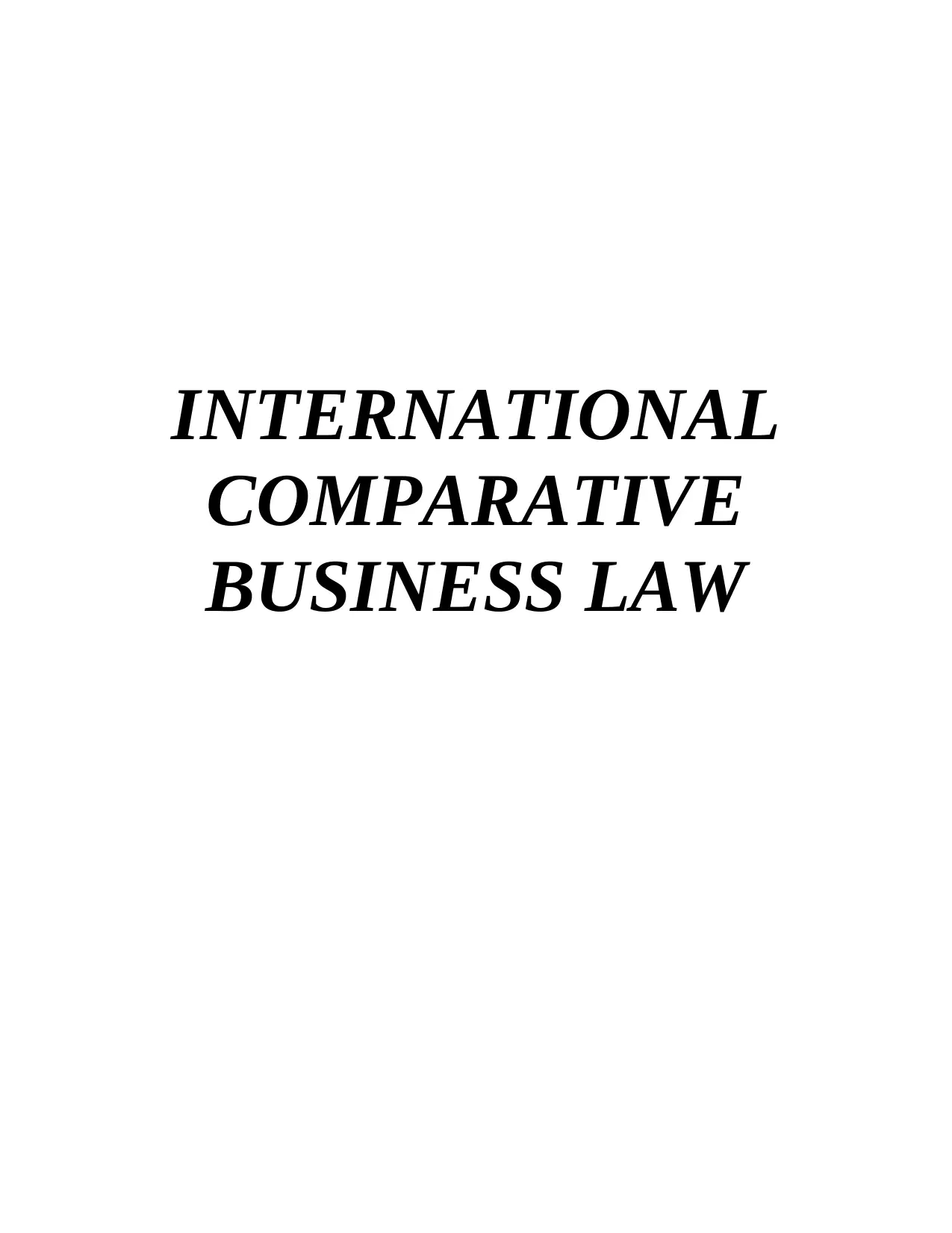
INTERNATIONAL
COMPARATIVE
BUSINESS LAW
COMPARATIVE
BUSINESS LAW
Paraphrase This Document
Need a fresh take? Get an instant paraphrase of this document with our AI Paraphraser
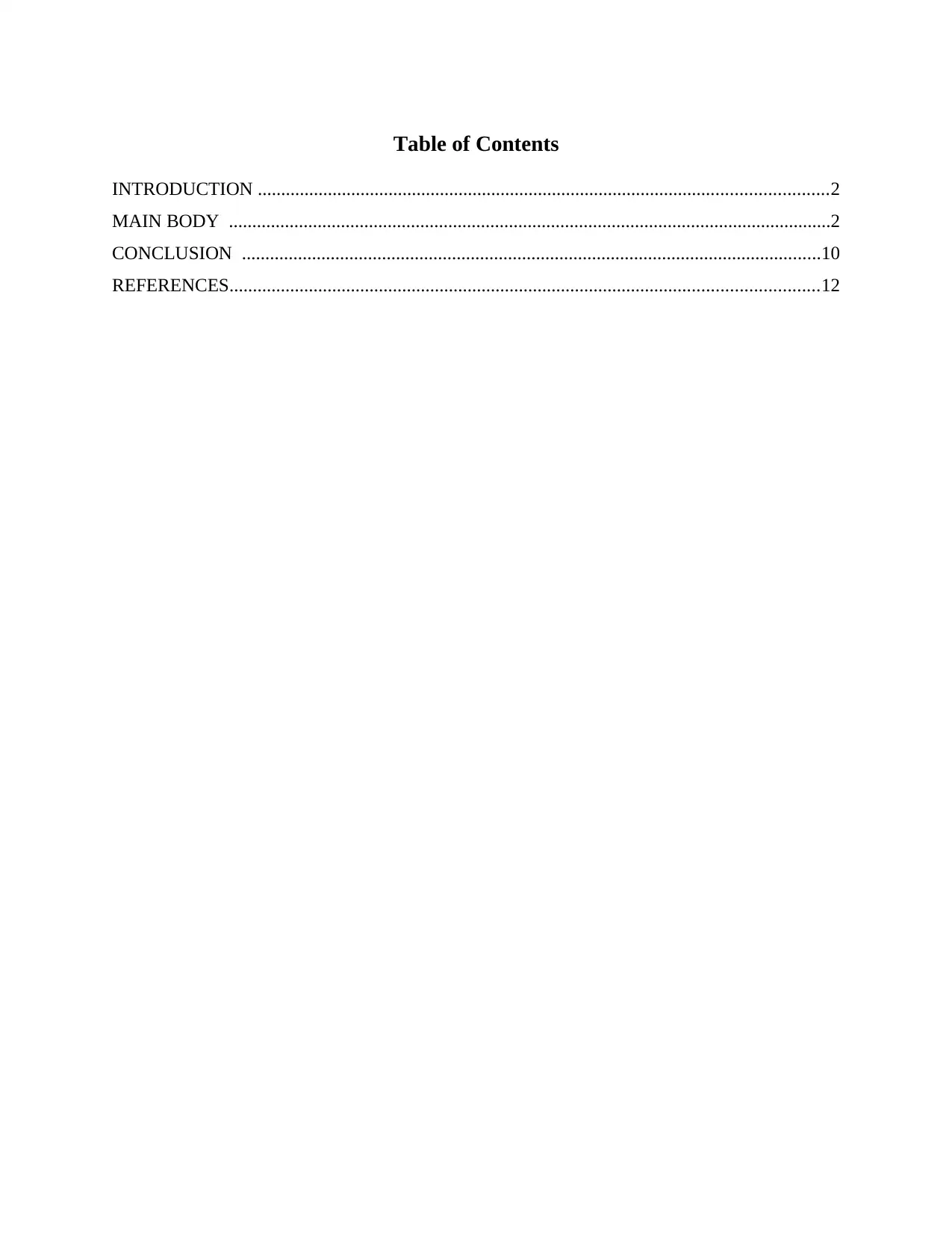
Table of Contents
INTRODUCTION ..........................................................................................................................2
MAIN BODY .................................................................................................................................2
CONCLUSION ............................................................................................................................10
REFERENCES..............................................................................................................................12
INTRODUCTION ..........................................................................................................................2
MAIN BODY .................................................................................................................................2
CONCLUSION ............................................................................................................................10
REFERENCES..............................................................................................................................12

⊘ This is a preview!⊘
Do you want full access?
Subscribe today to unlock all pages.

Trusted by 1+ million students worldwide
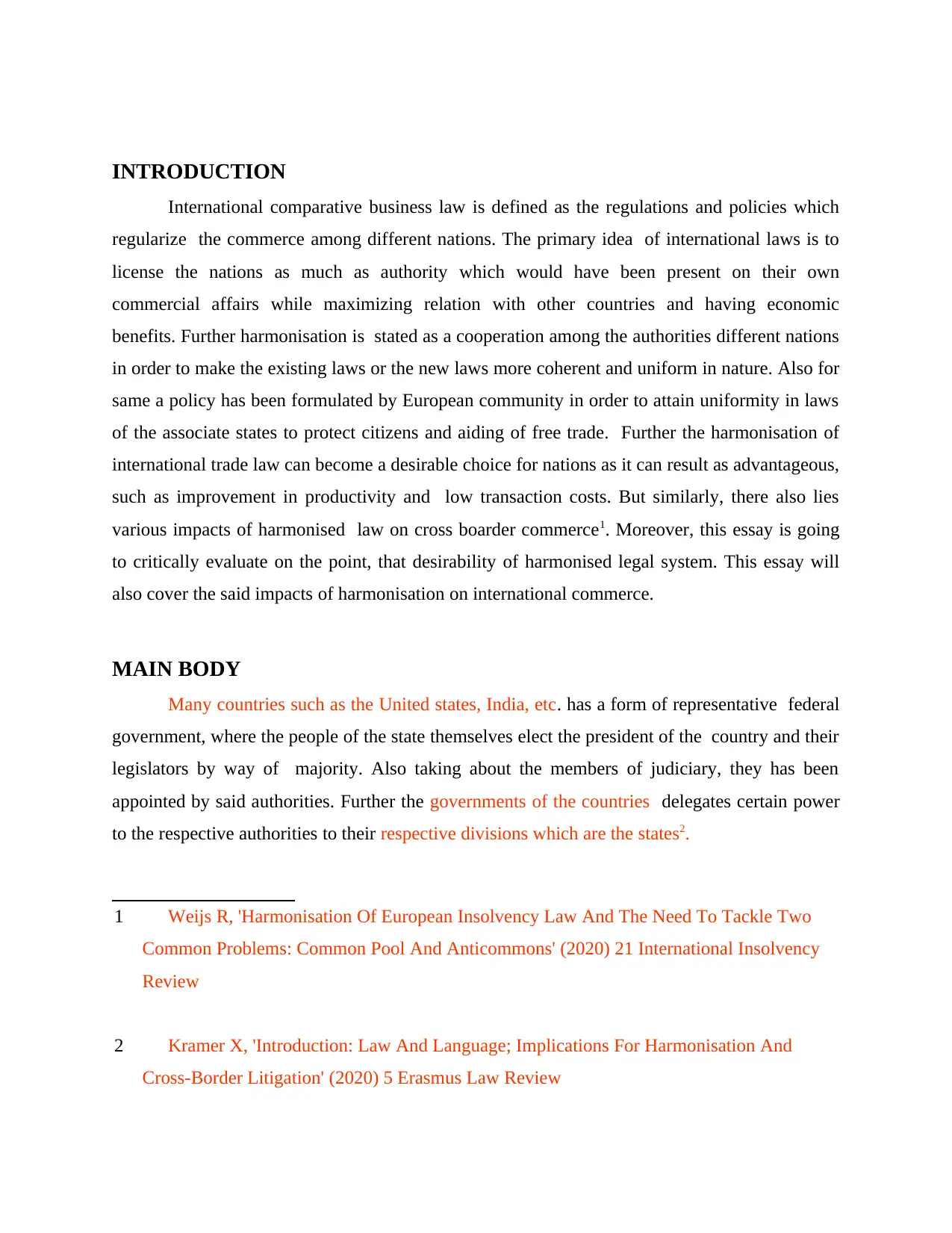
INTRODUCTION
International comparative business law is defined as the regulations and policies which
regularize the commerce among different nations. The primary idea of international laws is to
license the nations as much as authority which would have been present on their own
commercial affairs while maximizing relation with other countries and having economic
benefits. Further harmonisation is stated as a cooperation among the authorities different nations
in order to make the existing laws or the new laws more coherent and uniform in nature. Also for
same a policy has been formulated by European community in order to attain uniformity in laws
of the associate states to protect citizens and aiding of free trade. Further the harmonisation of
international trade law can become a desirable choice for nations as it can result as advantageous,
such as improvement in productivity and low transaction costs. But similarly, there also lies
various impacts of harmonised law on cross boarder commerce1. Moreover, this essay is going
to critically evaluate on the point, that desirability of harmonised legal system. This essay will
also cover the said impacts of harmonisation on international commerce.
MAIN BODY
Many countries such as the United states, India, etc. has a form of representative federal
government, where the people of the state themselves elect the president of the country and their
legislators by way of majority. Also taking about the members of judiciary, they has been
appointed by said authorities. Further the governments of the countries delegates certain power
to the respective authorities to their respective divisions which are the states2.
1 Weijs R, 'Harmonisation Of European Insolvency Law And The Need To Tackle Two
Common Problems: Common Pool And Anticommons' (2020) 21 International Insolvency
Review
2 Kramer X, 'Introduction: Law And Language; Implications For Harmonisation And
Cross-Border Litigation' (2020) 5 Erasmus Law Review
International comparative business law is defined as the regulations and policies which
regularize the commerce among different nations. The primary idea of international laws is to
license the nations as much as authority which would have been present on their own
commercial affairs while maximizing relation with other countries and having economic
benefits. Further harmonisation is stated as a cooperation among the authorities different nations
in order to make the existing laws or the new laws more coherent and uniform in nature. Also for
same a policy has been formulated by European community in order to attain uniformity in laws
of the associate states to protect citizens and aiding of free trade. Further the harmonisation of
international trade law can become a desirable choice for nations as it can result as advantageous,
such as improvement in productivity and low transaction costs. But similarly, there also lies
various impacts of harmonised law on cross boarder commerce1. Moreover, this essay is going
to critically evaluate on the point, that desirability of harmonised legal system. This essay will
also cover the said impacts of harmonisation on international commerce.
MAIN BODY
Many countries such as the United states, India, etc. has a form of representative federal
government, where the people of the state themselves elect the president of the country and their
legislators by way of majority. Also taking about the members of judiciary, they has been
appointed by said authorities. Further the governments of the countries delegates certain power
to the respective authorities to their respective divisions which are the states2.
1 Weijs R, 'Harmonisation Of European Insolvency Law And The Need To Tackle Two
Common Problems: Common Pool And Anticommons' (2020) 21 International Insolvency
Review
2 Kramer X, 'Introduction: Law And Language; Implications For Harmonisation And
Cross-Border Litigation' (2020) 5 Erasmus Law Review
Paraphrase This Document
Need a fresh take? Get an instant paraphrase of this document with our AI Paraphraser
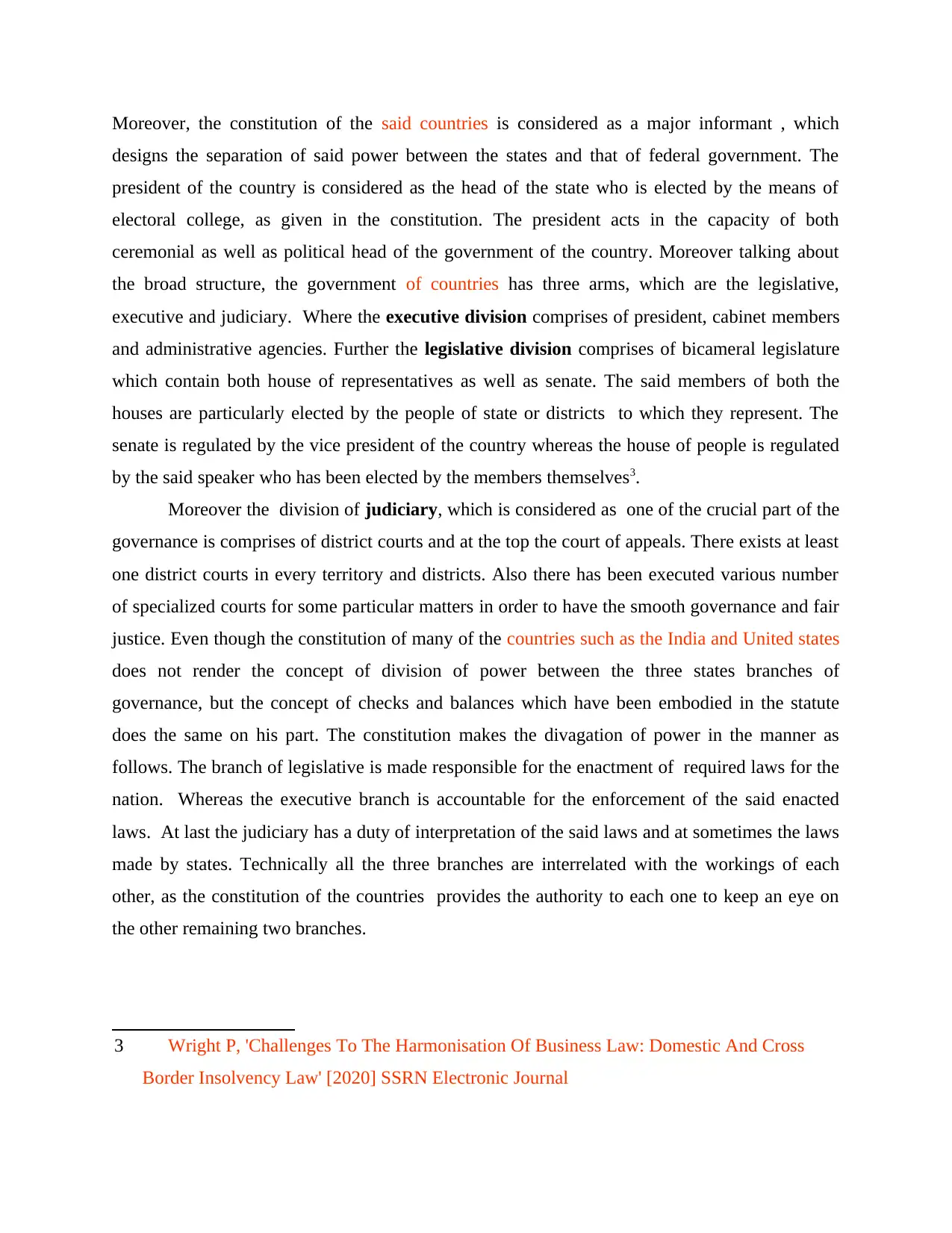
Moreover, the constitution of the said countries is considered as a major informant , which
designs the separation of said power between the states and that of federal government. The
president of the country is considered as the head of the state who is elected by the means of
electoral college, as given in the constitution. The president acts in the capacity of both
ceremonial as well as political head of the government of the country. Moreover talking about
the broad structure, the government of countries has three arms, which are the legislative,
executive and judiciary. Where the executive division comprises of president, cabinet members
and administrative agencies. Further the legislative division comprises of bicameral legislature
which contain both house of representatives as well as senate. The said members of both the
houses are particularly elected by the people of state or districts to which they represent. The
senate is regulated by the vice president of the country whereas the house of people is regulated
by the said speaker who has been elected by the members themselves3.
Moreover the division of judiciary, which is considered as one of the crucial part of the
governance is comprises of district courts and at the top the court of appeals. There exists at least
one district courts in every territory and districts. Also there has been executed various number
of specialized courts for some particular matters in order to have the smooth governance and fair
justice. Even though the constitution of many of the countries such as the India and United states
does not render the concept of division of power between the three states branches of
governance, but the concept of checks and balances which have been embodied in the statute
does the same on his part. The constitution makes the divagation of power in the manner as
follows. The branch of legislative is made responsible for the enactment of required laws for the
nation. Whereas the executive branch is accountable for the enforcement of the said enacted
laws. At last the judiciary has a duty of interpretation of the said laws and at sometimes the laws
made by states. Technically all the three branches are interrelated with the workings of each
other, as the constitution of the countries provides the authority to each one to keep an eye on
the other remaining two branches.
3 Wright P, 'Challenges To The Harmonisation Of Business Law: Domestic And Cross
Border Insolvency Law' [2020] SSRN Electronic Journal
designs the separation of said power between the states and that of federal government. The
president of the country is considered as the head of the state who is elected by the means of
electoral college, as given in the constitution. The president acts in the capacity of both
ceremonial as well as political head of the government of the country. Moreover talking about
the broad structure, the government of countries has three arms, which are the legislative,
executive and judiciary. Where the executive division comprises of president, cabinet members
and administrative agencies. Further the legislative division comprises of bicameral legislature
which contain both house of representatives as well as senate. The said members of both the
houses are particularly elected by the people of state or districts to which they represent. The
senate is regulated by the vice president of the country whereas the house of people is regulated
by the said speaker who has been elected by the members themselves3.
Moreover the division of judiciary, which is considered as one of the crucial part of the
governance is comprises of district courts and at the top the court of appeals. There exists at least
one district courts in every territory and districts. Also there has been executed various number
of specialized courts for some particular matters in order to have the smooth governance and fair
justice. Even though the constitution of many of the countries such as the India and United states
does not render the concept of division of power between the three states branches of
governance, but the concept of checks and balances which have been embodied in the statute
does the same on his part. The constitution makes the divagation of power in the manner as
follows. The branch of legislative is made responsible for the enactment of required laws for the
nation. Whereas the executive branch is accountable for the enforcement of the said enacted
laws. At last the judiciary has a duty of interpretation of the said laws and at sometimes the laws
made by states. Technically all the three branches are interrelated with the workings of each
other, as the constitution of the countries provides the authority to each one to keep an eye on
the other remaining two branches.
3 Wright P, 'Challenges To The Harmonisation Of Business Law: Domestic And Cross
Border Insolvency Law' [2020] SSRN Electronic Journal
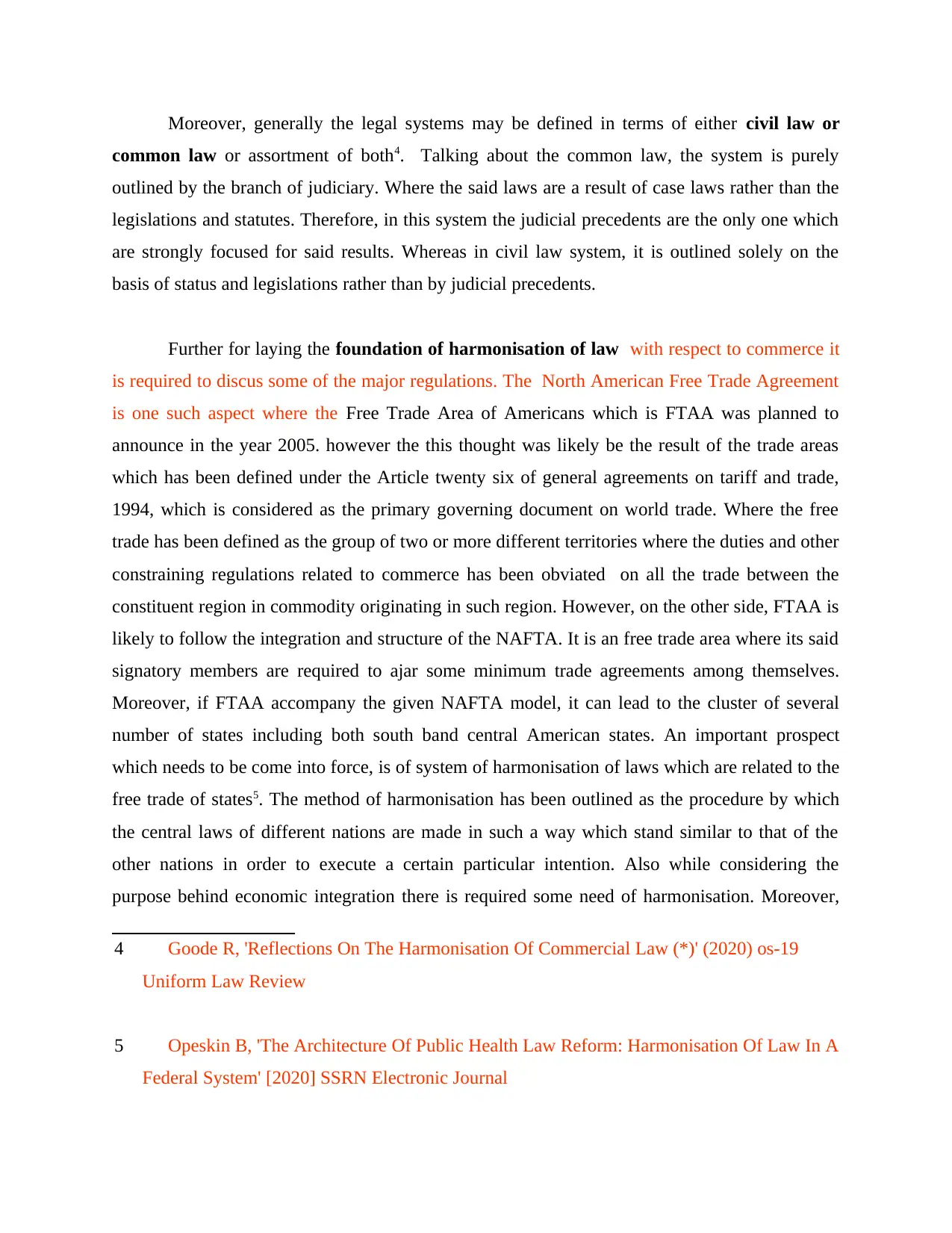
Moreover, generally the legal systems may be defined in terms of either civil law or
common law or assortment of both4. Talking about the common law, the system is purely
outlined by the branch of judiciary. Where the said laws are a result of case laws rather than the
legislations and statutes. Therefore, in this system the judicial precedents are the only one which
are strongly focused for said results. Whereas in civil law system, it is outlined solely on the
basis of status and legislations rather than by judicial precedents.
Further for laying the foundation of harmonisation of law with respect to commerce it
is required to discus some of the major regulations. The North American Free Trade Agreement
is one such aspect where the Free Trade Area of Americans which is FTAA was planned to
announce in the year 2005. however the this thought was likely be the result of the trade areas
which has been defined under the Article twenty six of general agreements on tariff and trade,
1994, which is considered as the primary governing document on world trade. Where the free
trade has been defined as the group of two or more different territories where the duties and other
constraining regulations related to commerce has been obviated on all the trade between the
constituent region in commodity originating in such region. However, on the other side, FTAA is
likely to follow the integration and structure of the NAFTA. It is an free trade area where its said
signatory members are required to ajar some minimum trade agreements among themselves.
Moreover, if FTAA accompany the given NAFTA model, it can lead to the cluster of several
number of states including both south band central American states. An important prospect
which needs to be come into force, is of system of harmonisation of laws which are related to the
free trade of states5. The method of harmonisation has been outlined as the procedure by which
the central laws of different nations are made in such a way which stand similar to that of the
other nations in order to execute a certain particular intention. Also while considering the
purpose behind economic integration there is required some need of harmonisation. Moreover,
4 Goode R, 'Reflections On The Harmonisation Of Commercial Law (*)' (2020) os-19
Uniform Law Review
5 Opeskin B, 'The Architecture Of Public Health Law Reform: Harmonisation Of Law In A
Federal System' [2020] SSRN Electronic Journal
common law or assortment of both4. Talking about the common law, the system is purely
outlined by the branch of judiciary. Where the said laws are a result of case laws rather than the
legislations and statutes. Therefore, in this system the judicial precedents are the only one which
are strongly focused for said results. Whereas in civil law system, it is outlined solely on the
basis of status and legislations rather than by judicial precedents.
Further for laying the foundation of harmonisation of law with respect to commerce it
is required to discus some of the major regulations. The North American Free Trade Agreement
is one such aspect where the Free Trade Area of Americans which is FTAA was planned to
announce in the year 2005. however the this thought was likely be the result of the trade areas
which has been defined under the Article twenty six of general agreements on tariff and trade,
1994, which is considered as the primary governing document on world trade. Where the free
trade has been defined as the group of two or more different territories where the duties and other
constraining regulations related to commerce has been obviated on all the trade between the
constituent region in commodity originating in such region. However, on the other side, FTAA is
likely to follow the integration and structure of the NAFTA. It is an free trade area where its said
signatory members are required to ajar some minimum trade agreements among themselves.
Moreover, if FTAA accompany the given NAFTA model, it can lead to the cluster of several
number of states including both south band central American states. An important prospect
which needs to be come into force, is of system of harmonisation of laws which are related to the
free trade of states5. The method of harmonisation has been outlined as the procedure by which
the central laws of different nations are made in such a way which stand similar to that of the
other nations in order to execute a certain particular intention. Also while considering the
purpose behind economic integration there is required some need of harmonisation. Moreover,
4 Goode R, 'Reflections On The Harmonisation Of Commercial Law (*)' (2020) os-19
Uniform Law Review
5 Opeskin B, 'The Architecture Of Public Health Law Reform: Harmonisation Of Law In A
Federal System' [2020] SSRN Electronic Journal
⊘ This is a preview!⊘
Do you want full access?
Subscribe today to unlock all pages.

Trusted by 1+ million students worldwide
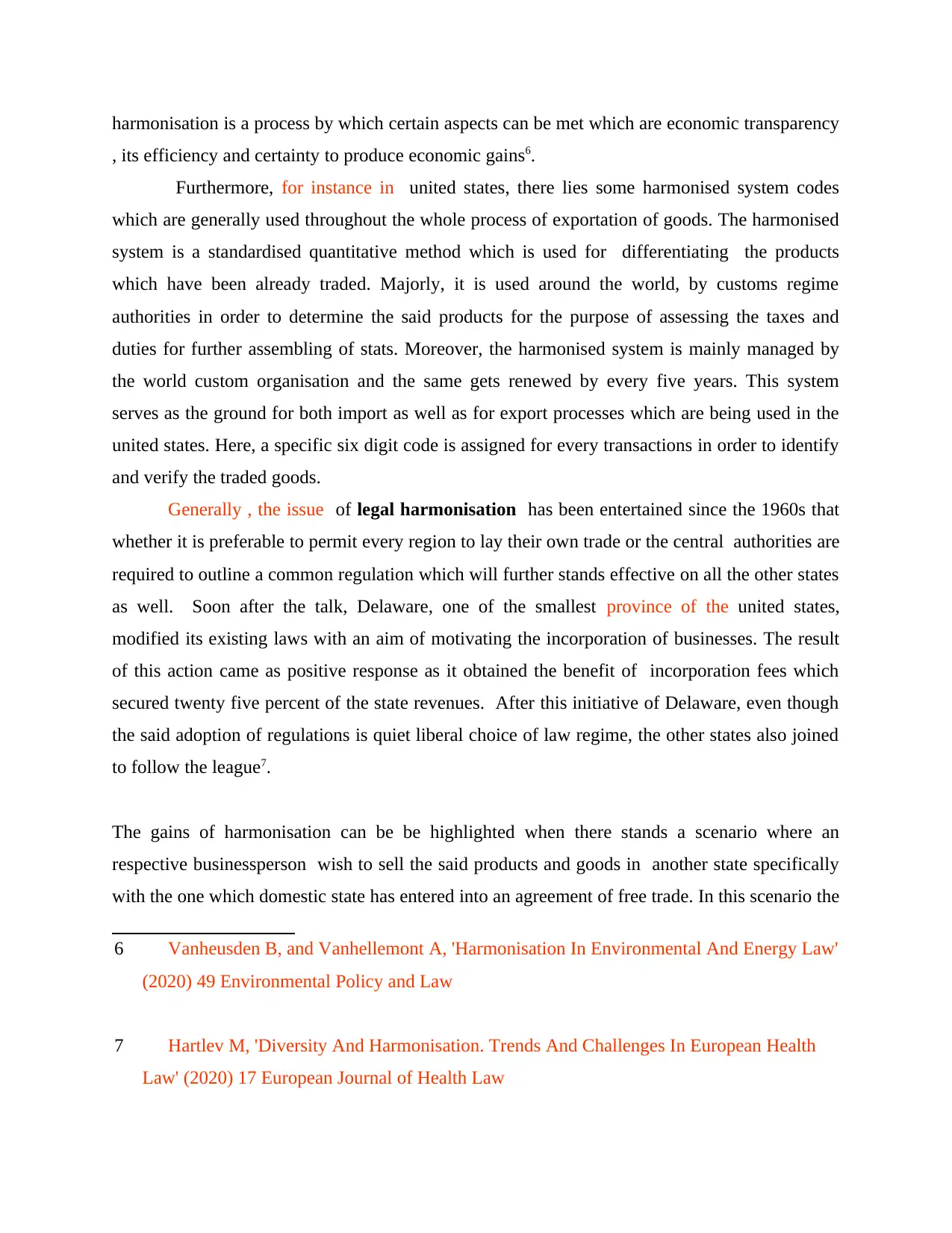
harmonisation is a process by which certain aspects can be met which are economic transparency
, its efficiency and certainty to produce economic gains6.
Furthermore, for instance in united states, there lies some harmonised system codes
which are generally used throughout the whole process of exportation of goods. The harmonised
system is a standardised quantitative method which is used for differentiating the products
which have been already traded. Majorly, it is used around the world, by customs regime
authorities in order to determine the said products for the purpose of assessing the taxes and
duties for further assembling of stats. Moreover, the harmonised system is mainly managed by
the world custom organisation and the same gets renewed by every five years. This system
serves as the ground for both import as well as for export processes which are being used in the
united states. Here, a specific six digit code is assigned for every transactions in order to identify
and verify the traded goods.
Generally , the issue of legal harmonisation has been entertained since the 1960s that
whether it is preferable to permit every region to lay their own trade or the central authorities are
required to outline a common regulation which will further stands effective on all the other states
as well. Soon after the talk, Delaware, one of the smallest province of the united states,
modified its existing laws with an aim of motivating the incorporation of businesses. The result
of this action came as positive response as it obtained the benefit of incorporation fees which
secured twenty five percent of the state revenues. After this initiative of Delaware, even though
the said adoption of regulations is quiet liberal choice of law regime, the other states also joined
to follow the league7.
The gains of harmonisation can be be highlighted when there stands a scenario where an
respective businessperson wish to sell the said products and goods in another state specifically
with the one which domestic state has entered into an agreement of free trade. In this scenario the
6 Vanheusden B, and Vanhellemont A, 'Harmonisation In Environmental And Energy Law'
(2020) 49 Environmental Policy and Law
7 Hartlev M, 'Diversity And Harmonisation. Trends And Challenges In European Health
Law' (2020) 17 European Journal of Health Law
, its efficiency and certainty to produce economic gains6.
Furthermore, for instance in united states, there lies some harmonised system codes
which are generally used throughout the whole process of exportation of goods. The harmonised
system is a standardised quantitative method which is used for differentiating the products
which have been already traded. Majorly, it is used around the world, by customs regime
authorities in order to determine the said products for the purpose of assessing the taxes and
duties for further assembling of stats. Moreover, the harmonised system is mainly managed by
the world custom organisation and the same gets renewed by every five years. This system
serves as the ground for both import as well as for export processes which are being used in the
united states. Here, a specific six digit code is assigned for every transactions in order to identify
and verify the traded goods.
Generally , the issue of legal harmonisation has been entertained since the 1960s that
whether it is preferable to permit every region to lay their own trade or the central authorities are
required to outline a common regulation which will further stands effective on all the other states
as well. Soon after the talk, Delaware, one of the smallest province of the united states,
modified its existing laws with an aim of motivating the incorporation of businesses. The result
of this action came as positive response as it obtained the benefit of incorporation fees which
secured twenty five percent of the state revenues. After this initiative of Delaware, even though
the said adoption of regulations is quiet liberal choice of law regime, the other states also joined
to follow the league7.
The gains of harmonisation can be be highlighted when there stands a scenario where an
respective businessperson wish to sell the said products and goods in another state specifically
with the one which domestic state has entered into an agreement of free trade. In this scenario the
6 Vanheusden B, and Vanhellemont A, 'Harmonisation In Environmental And Energy Law'
(2020) 49 Environmental Policy and Law
7 Hartlev M, 'Diversity And Harmonisation. Trends And Challenges In European Health
Law' (2020) 17 European Journal of Health Law
Paraphrase This Document
Need a fresh take? Get an instant paraphrase of this document with our AI Paraphraser
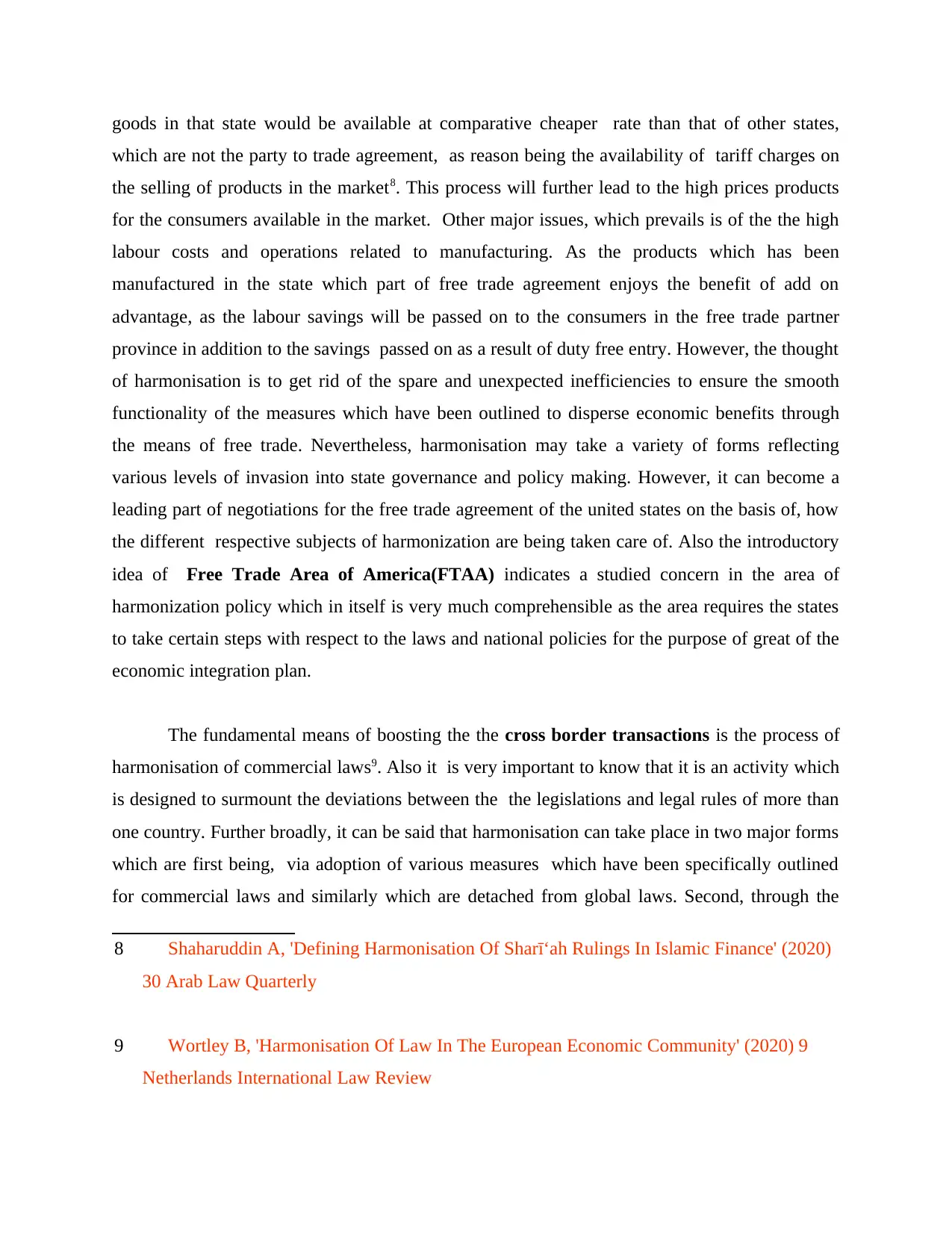
goods in that state would be available at comparative cheaper rate than that of other states,
which are not the party to trade agreement, as reason being the availability of tariff charges on
the selling of products in the market8. This process will further lead to the high prices products
for the consumers available in the market. Other major issues, which prevails is of the the high
labour costs and operations related to manufacturing. As the products which has been
manufactured in the state which part of free trade agreement enjoys the benefit of add on
advantage, as the labour savings will be passed on to the consumers in the free trade partner
province in addition to the savings passed on as a result of duty free entry. However, the thought
of harmonisation is to get rid of the spare and unexpected inefficiencies to ensure the smooth
functionality of the measures which have been outlined to disperse economic benefits through
the means of free trade. Nevertheless, harmonisation may take a variety of forms reflecting
various levels of invasion into state governance and policy making. However, it can become a
leading part of negotiations for the free trade agreement of the united states on the basis of, how
the different respective subjects of harmonization are being taken care of. Also the introductory
idea of Free Trade Area of America(FTAA) indicates a studied concern in the area of
harmonization policy which in itself is very much comprehensible as the area requires the states
to take certain steps with respect to the laws and national policies for the purpose of great of the
economic integration plan.
The fundamental means of boosting the the cross border transactions is the process of
harmonisation of commercial laws9. Also it is very important to know that it is an activity which
is designed to surmount the deviations between the the legislations and legal rules of more than
one country. Further broadly, it can be said that harmonisation can take place in two major forms
which are first being, via adoption of various measures which have been specifically outlined
for commercial laws and similarly which are detached from global laws. Second, through the
8 Shaharuddin A, 'Defining Harmonisation Of Sharīʻah Rulings In Islamic Finance' (2020)
30 Arab Law Quarterly
9 Wortley B, 'Harmonisation Of Law In The European Economic Community' (2020) 9
Netherlands International Law Review
which are not the party to trade agreement, as reason being the availability of tariff charges on
the selling of products in the market8. This process will further lead to the high prices products
for the consumers available in the market. Other major issues, which prevails is of the the high
labour costs and operations related to manufacturing. As the products which has been
manufactured in the state which part of free trade agreement enjoys the benefit of add on
advantage, as the labour savings will be passed on to the consumers in the free trade partner
province in addition to the savings passed on as a result of duty free entry. However, the thought
of harmonisation is to get rid of the spare and unexpected inefficiencies to ensure the smooth
functionality of the measures which have been outlined to disperse economic benefits through
the means of free trade. Nevertheless, harmonisation may take a variety of forms reflecting
various levels of invasion into state governance and policy making. However, it can become a
leading part of negotiations for the free trade agreement of the united states on the basis of, how
the different respective subjects of harmonization are being taken care of. Also the introductory
idea of Free Trade Area of America(FTAA) indicates a studied concern in the area of
harmonization policy which in itself is very much comprehensible as the area requires the states
to take certain steps with respect to the laws and national policies for the purpose of great of the
economic integration plan.
The fundamental means of boosting the the cross border transactions is the process of
harmonisation of commercial laws9. Also it is very important to know that it is an activity which
is designed to surmount the deviations between the the legislations and legal rules of more than
one country. Further broadly, it can be said that harmonisation can take place in two major forms
which are first being, via adoption of various measures which have been specifically outlined
for commercial laws and similarly which are detached from global laws. Second, through the
8 Shaharuddin A, 'Defining Harmonisation Of Sharīʻah Rulings In Islamic Finance' (2020)
30 Arab Law Quarterly
9 Wortley B, 'Harmonisation Of Law In The European Economic Community' (2020) 9
Netherlands International Law Review
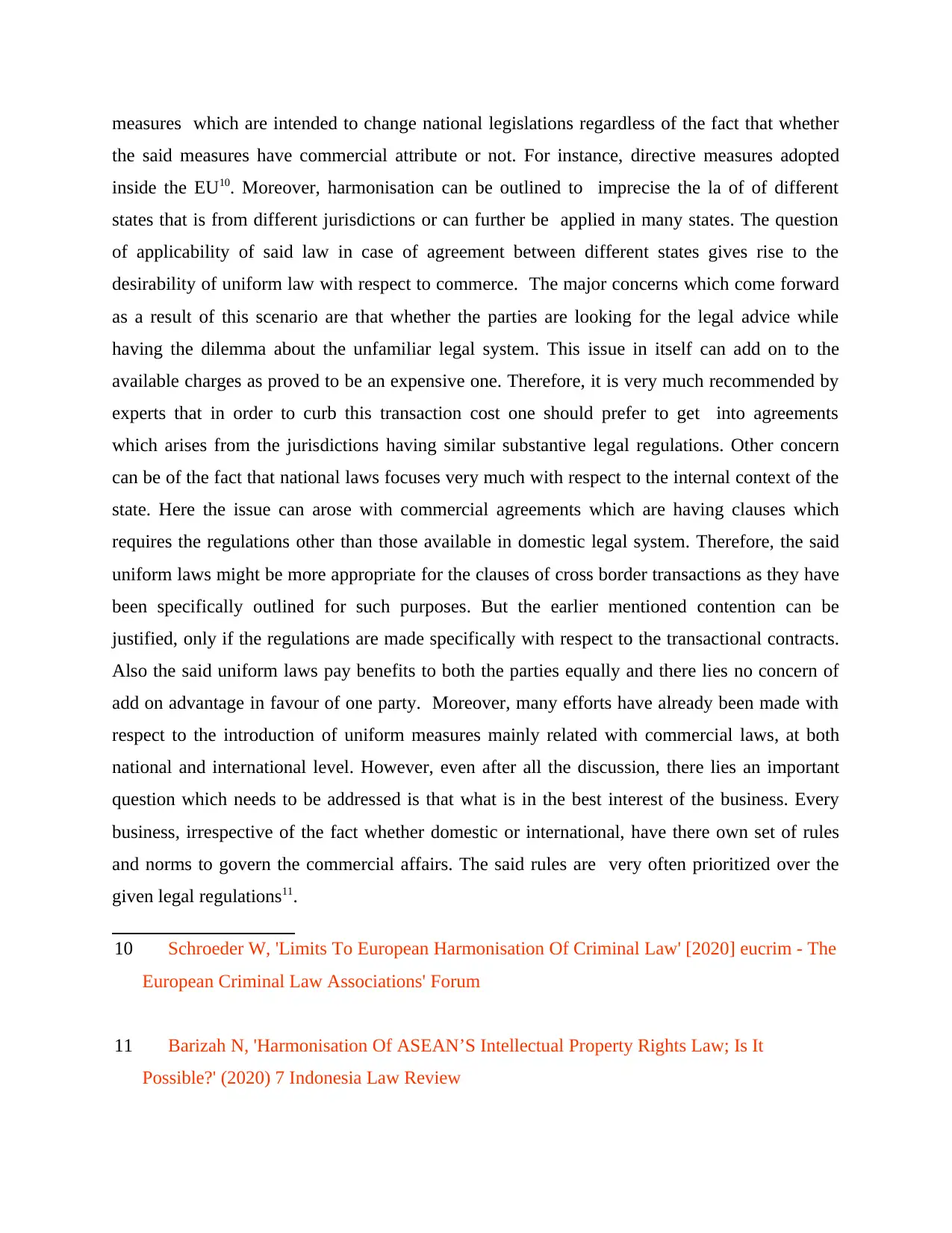
measures which are intended to change national legislations regardless of the fact that whether
the said measures have commercial attribute or not. For instance, directive measures adopted
inside the EU10. Moreover, harmonisation can be outlined to imprecise the la of of different
states that is from different jurisdictions or can further be applied in many states. The question
of applicability of said law in case of agreement between different states gives rise to the
desirability of uniform law with respect to commerce. The major concerns which come forward
as a result of this scenario are that whether the parties are looking for the legal advice while
having the dilemma about the unfamiliar legal system. This issue in itself can add on to the
available charges as proved to be an expensive one. Therefore, it is very much recommended by
experts that in order to curb this transaction cost one should prefer to get into agreements
which arises from the jurisdictions having similar substantive legal regulations. Other concern
can be of the fact that national laws focuses very much with respect to the internal context of the
state. Here the issue can arose with commercial agreements which are having clauses which
requires the regulations other than those available in domestic legal system. Therefore, the said
uniform laws might be more appropriate for the clauses of cross border transactions as they have
been specifically outlined for such purposes. But the earlier mentioned contention can be
justified, only if the regulations are made specifically with respect to the transactional contracts.
Also the said uniform laws pay benefits to both the parties equally and there lies no concern of
add on advantage in favour of one party. Moreover, many efforts have already been made with
respect to the introduction of uniform measures mainly related with commercial laws, at both
national and international level. However, even after all the discussion, there lies an important
question which needs to be addressed is that what is in the best interest of the business. Every
business, irrespective of the fact whether domestic or international, have there own set of rules
and norms to govern the commercial affairs. The said rules are very often prioritized over the
given legal regulations11.
10 Schroeder W, 'Limits To European Harmonisation Of Criminal Law' [2020] eucrim - The
European Criminal Law Associations' Forum
11 Barizah N, 'Harmonisation Of ASEAN’S Intellectual Property Rights Law; Is It
Possible?' (2020) 7 Indonesia Law Review
the said measures have commercial attribute or not. For instance, directive measures adopted
inside the EU10. Moreover, harmonisation can be outlined to imprecise the la of of different
states that is from different jurisdictions or can further be applied in many states. The question
of applicability of said law in case of agreement between different states gives rise to the
desirability of uniform law with respect to commerce. The major concerns which come forward
as a result of this scenario are that whether the parties are looking for the legal advice while
having the dilemma about the unfamiliar legal system. This issue in itself can add on to the
available charges as proved to be an expensive one. Therefore, it is very much recommended by
experts that in order to curb this transaction cost one should prefer to get into agreements
which arises from the jurisdictions having similar substantive legal regulations. Other concern
can be of the fact that national laws focuses very much with respect to the internal context of the
state. Here the issue can arose with commercial agreements which are having clauses which
requires the regulations other than those available in domestic legal system. Therefore, the said
uniform laws might be more appropriate for the clauses of cross border transactions as they have
been specifically outlined for such purposes. But the earlier mentioned contention can be
justified, only if the regulations are made specifically with respect to the transactional contracts.
Also the said uniform laws pay benefits to both the parties equally and there lies no concern of
add on advantage in favour of one party. Moreover, many efforts have already been made with
respect to the introduction of uniform measures mainly related with commercial laws, at both
national and international level. However, even after all the discussion, there lies an important
question which needs to be addressed is that what is in the best interest of the business. Every
business, irrespective of the fact whether domestic or international, have there own set of rules
and norms to govern the commercial affairs. The said rules are very often prioritized over the
given legal regulations11.
10 Schroeder W, 'Limits To European Harmonisation Of Criminal Law' [2020] eucrim - The
European Criminal Law Associations' Forum
11 Barizah N, 'Harmonisation Of ASEAN’S Intellectual Property Rights Law; Is It
Possible?' (2020) 7 Indonesia Law Review
⊘ This is a preview!⊘
Do you want full access?
Subscribe today to unlock all pages.

Trusted by 1+ million students worldwide
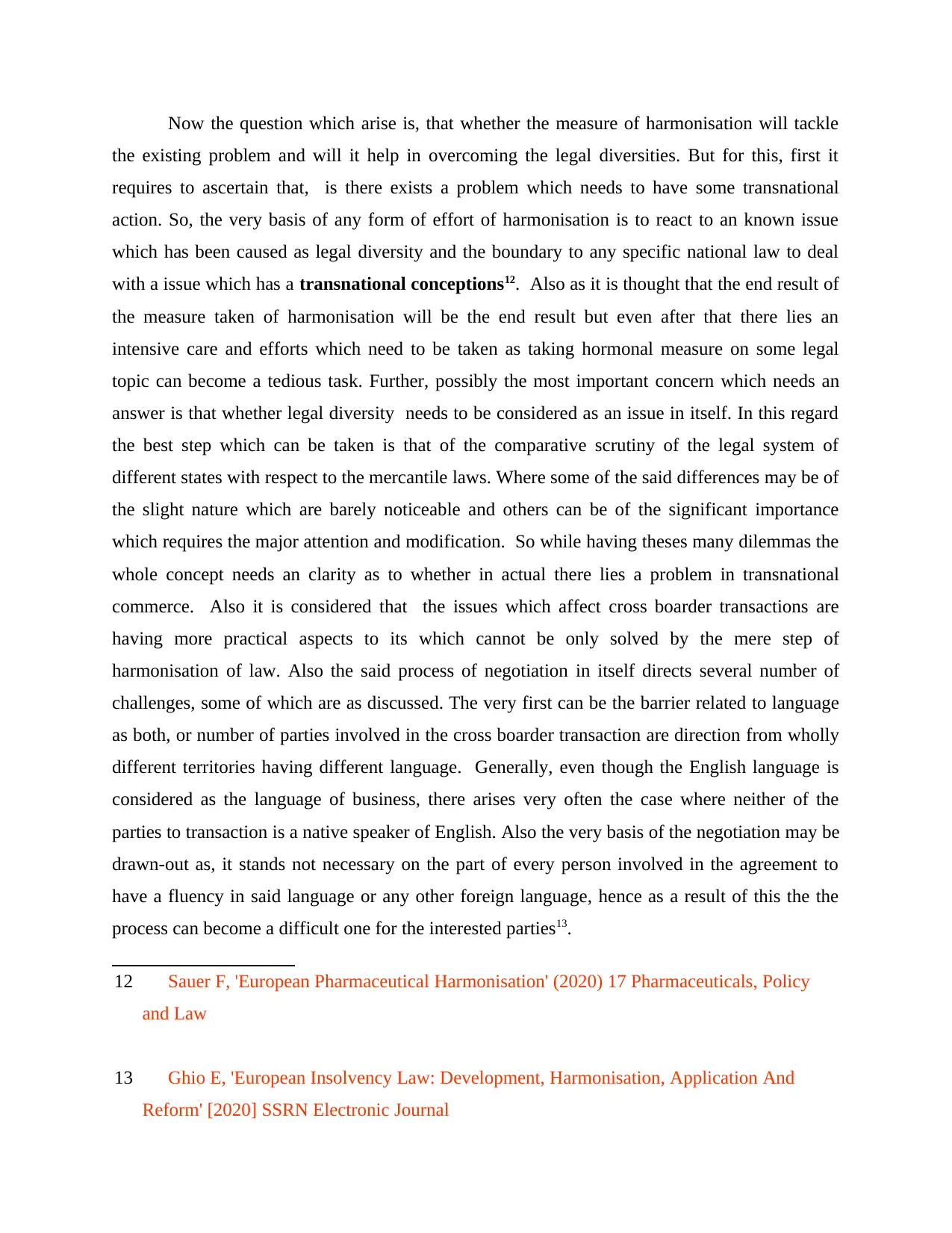
Now the question which arise is, that whether the measure of harmonisation will tackle
the existing problem and will it help in overcoming the legal diversities. But for this, first it
requires to ascertain that, is there exists a problem which needs to have some transnational
action. So, the very basis of any form of effort of harmonisation is to react to an known issue
which has been caused as legal diversity and the boundary to any specific national law to deal
with a issue which has a transnational conceptions12. Also as it is thought that the end result of
the measure taken of harmonisation will be the end result but even after that there lies an
intensive care and efforts which need to be taken as taking hormonal measure on some legal
topic can become a tedious task. Further, possibly the most important concern which needs an
answer is that whether legal diversity needs to be considered as an issue in itself. In this regard
the best step which can be taken is that of the comparative scrutiny of the legal system of
different states with respect to the mercantile laws. Where some of the said differences may be of
the slight nature which are barely noticeable and others can be of the significant importance
which requires the major attention and modification. So while having theses many dilemmas the
whole concept needs an clarity as to whether in actual there lies a problem in transnational
commerce. Also it is considered that the issues which affect cross boarder transactions are
having more practical aspects to its which cannot be only solved by the mere step of
harmonisation of law. Also the said process of negotiation in itself directs several number of
challenges, some of which are as discussed. The very first can be the barrier related to language
as both, or number of parties involved in the cross boarder transaction are direction from wholly
different territories having different language. Generally, even though the English language is
considered as the language of business, there arises very often the case where neither of the
parties to transaction is a native speaker of English. Also the very basis of the negotiation may be
drawn-out as, it stands not necessary on the part of every person involved in the agreement to
have a fluency in said language or any other foreign language, hence as a result of this the the
process can become a difficult one for the interested parties13.
12 Sauer F, 'European Pharmaceutical Harmonisation' (2020) 17 Pharmaceuticals, Policy
and Law
13 Ghio E, 'European Insolvency Law: Development, Harmonisation, Application And
Reform' [2020] SSRN Electronic Journal
the existing problem and will it help in overcoming the legal diversities. But for this, first it
requires to ascertain that, is there exists a problem which needs to have some transnational
action. So, the very basis of any form of effort of harmonisation is to react to an known issue
which has been caused as legal diversity and the boundary to any specific national law to deal
with a issue which has a transnational conceptions12. Also as it is thought that the end result of
the measure taken of harmonisation will be the end result but even after that there lies an
intensive care and efforts which need to be taken as taking hormonal measure on some legal
topic can become a tedious task. Further, possibly the most important concern which needs an
answer is that whether legal diversity needs to be considered as an issue in itself. In this regard
the best step which can be taken is that of the comparative scrutiny of the legal system of
different states with respect to the mercantile laws. Where some of the said differences may be of
the slight nature which are barely noticeable and others can be of the significant importance
which requires the major attention and modification. So while having theses many dilemmas the
whole concept needs an clarity as to whether in actual there lies a problem in transnational
commerce. Also it is considered that the issues which affect cross boarder transactions are
having more practical aspects to its which cannot be only solved by the mere step of
harmonisation of law. Also the said process of negotiation in itself directs several number of
challenges, some of which are as discussed. The very first can be the barrier related to language
as both, or number of parties involved in the cross boarder transaction are direction from wholly
different territories having different language. Generally, even though the English language is
considered as the language of business, there arises very often the case where neither of the
parties to transaction is a native speaker of English. Also the very basis of the negotiation may be
drawn-out as, it stands not necessary on the part of every person involved in the agreement to
have a fluency in said language or any other foreign language, hence as a result of this the the
process can become a difficult one for the interested parties13.
12 Sauer F, 'European Pharmaceutical Harmonisation' (2020) 17 Pharmaceuticals, Policy
and Law
13 Ghio E, 'European Insolvency Law: Development, Harmonisation, Application And
Reform' [2020] SSRN Electronic Journal
Paraphrase This Document
Need a fresh take? Get an instant paraphrase of this document with our AI Paraphraser
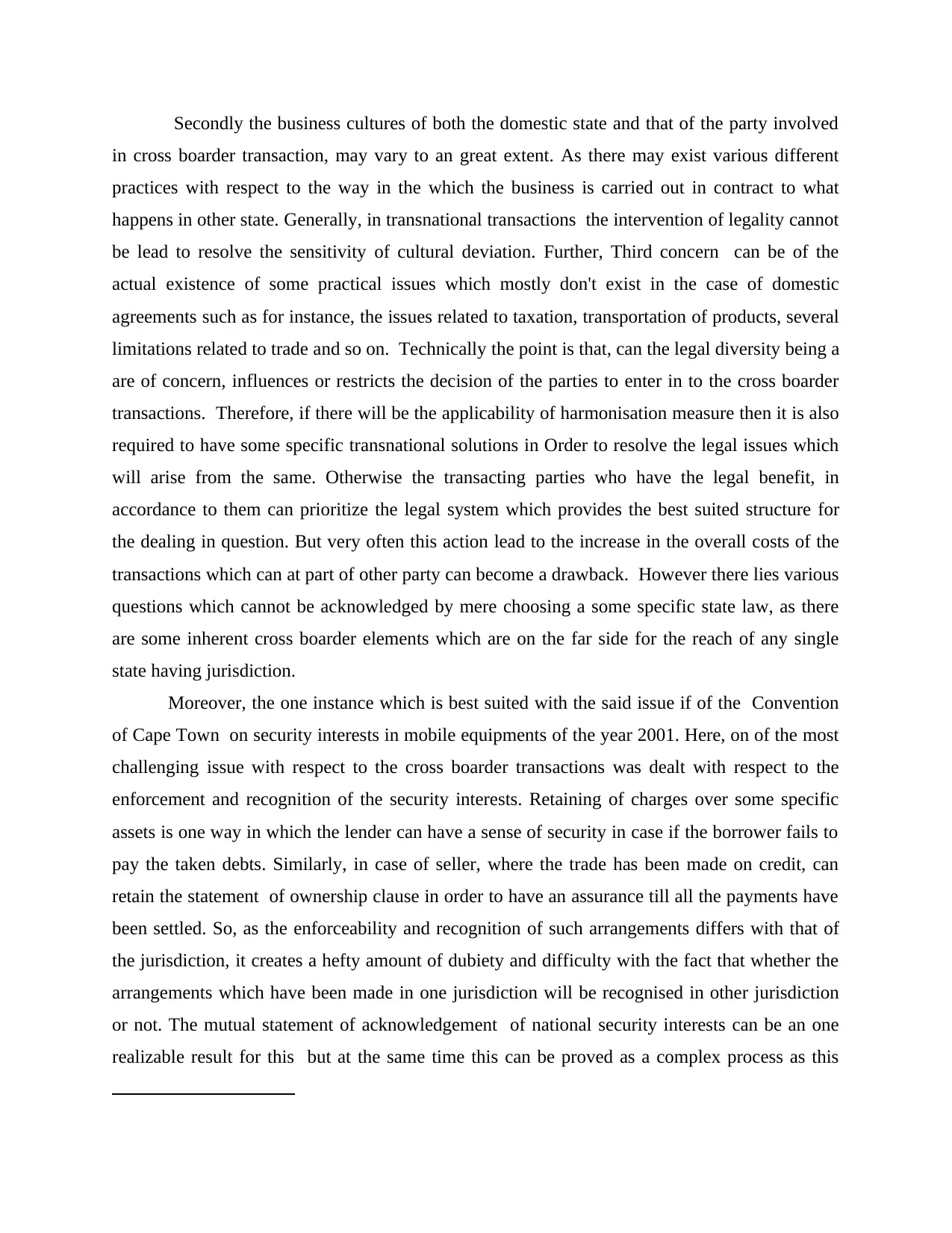
Secondly the business cultures of both the domestic state and that of the party involved
in cross boarder transaction, may vary to an great extent. As there may exist various different
practices with respect to the way in the which the business is carried out in contract to what
happens in other state. Generally, in transnational transactions the intervention of legality cannot
be lead to resolve the sensitivity of cultural deviation. Further, Third concern can be of the
actual existence of some practical issues which mostly don't exist in the case of domestic
agreements such as for instance, the issues related to taxation, transportation of products, several
limitations related to trade and so on. Technically the point is that, can the legal diversity being a
are of concern, influences or restricts the decision of the parties to enter in to the cross boarder
transactions. Therefore, if there will be the applicability of harmonisation measure then it is also
required to have some specific transnational solutions in Order to resolve the legal issues which
will arise from the same. Otherwise the transacting parties who have the legal benefit, in
accordance to them can prioritize the legal system which provides the best suited structure for
the dealing in question. But very often this action lead to the increase in the overall costs of the
transactions which can at part of other party can become a drawback. However there lies various
questions which cannot be acknowledged by mere choosing a some specific state law, as there
are some inherent cross boarder elements which are on the far side for the reach of any single
state having jurisdiction.
Moreover, the one instance which is best suited with the said issue if of the Convention
of Cape Town on security interests in mobile equipments of the year 2001. Here, on of the most
challenging issue with respect to the cross boarder transactions was dealt with respect to the
enforcement and recognition of the security interests. Retaining of charges over some specific
assets is one way in which the lender can have a sense of security in case if the borrower fails to
pay the taken debts. Similarly, in case of seller, where the trade has been made on credit, can
retain the statement of ownership clause in order to have an assurance till all the payments have
been settled. So, as the enforceability and recognition of such arrangements differs with that of
the jurisdiction, it creates a hefty amount of dubiety and difficulty with the fact that whether the
arrangements which have been made in one jurisdiction will be recognised in other jurisdiction
or not. The mutual statement of acknowledgement of national security interests can be an one
realizable result for this but at the same time this can be proved as a complex process as this
in cross boarder transaction, may vary to an great extent. As there may exist various different
practices with respect to the way in the which the business is carried out in contract to what
happens in other state. Generally, in transnational transactions the intervention of legality cannot
be lead to resolve the sensitivity of cultural deviation. Further, Third concern can be of the
actual existence of some practical issues which mostly don't exist in the case of domestic
agreements such as for instance, the issues related to taxation, transportation of products, several
limitations related to trade and so on. Technically the point is that, can the legal diversity being a
are of concern, influences or restricts the decision of the parties to enter in to the cross boarder
transactions. Therefore, if there will be the applicability of harmonisation measure then it is also
required to have some specific transnational solutions in Order to resolve the legal issues which
will arise from the same. Otherwise the transacting parties who have the legal benefit, in
accordance to them can prioritize the legal system which provides the best suited structure for
the dealing in question. But very often this action lead to the increase in the overall costs of the
transactions which can at part of other party can become a drawback. However there lies various
questions which cannot be acknowledged by mere choosing a some specific state law, as there
are some inherent cross boarder elements which are on the far side for the reach of any single
state having jurisdiction.
Moreover, the one instance which is best suited with the said issue if of the Convention
of Cape Town on security interests in mobile equipments of the year 2001. Here, on of the most
challenging issue with respect to the cross boarder transactions was dealt with respect to the
enforcement and recognition of the security interests. Retaining of charges over some specific
assets is one way in which the lender can have a sense of security in case if the borrower fails to
pay the taken debts. Similarly, in case of seller, where the trade has been made on credit, can
retain the statement of ownership clause in order to have an assurance till all the payments have
been settled. So, as the enforceability and recognition of such arrangements differs with that of
the jurisdiction, it creates a hefty amount of dubiety and difficulty with the fact that whether the
arrangements which have been made in one jurisdiction will be recognised in other jurisdiction
or not. The mutual statement of acknowledgement of national security interests can be an one
realizable result for this but at the same time this can be proved as a complex process as this
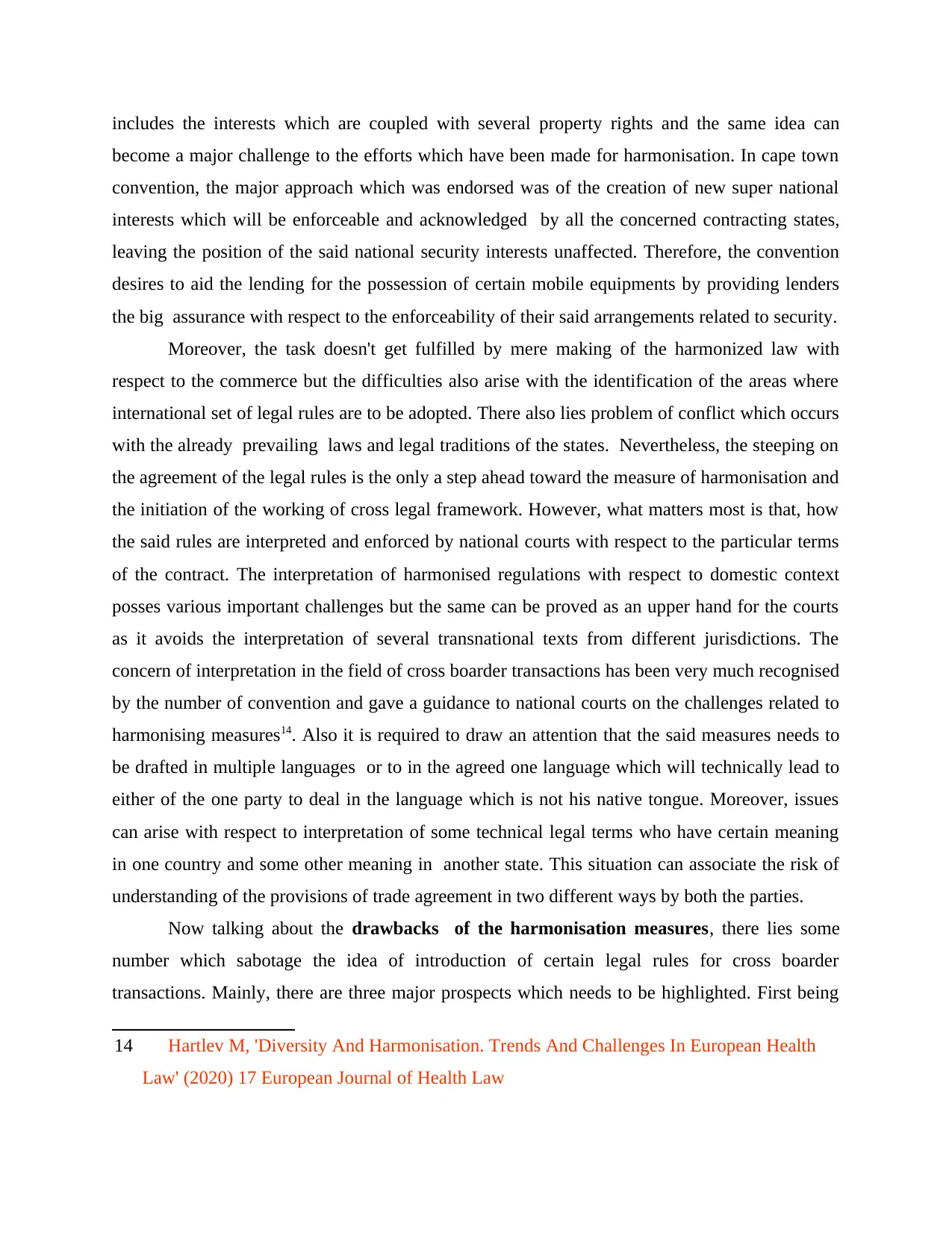
includes the interests which are coupled with several property rights and the same idea can
become a major challenge to the efforts which have been made for harmonisation. In cape town
convention, the major approach which was endorsed was of the creation of new super national
interests which will be enforceable and acknowledged by all the concerned contracting states,
leaving the position of the said national security interests unaffected. Therefore, the convention
desires to aid the lending for the possession of certain mobile equipments by providing lenders
the big assurance with respect to the enforceability of their said arrangements related to security.
Moreover, the task doesn't get fulfilled by mere making of the harmonized law with
respect to the commerce but the difficulties also arise with the identification of the areas where
international set of legal rules are to be adopted. There also lies problem of conflict which occurs
with the already prevailing laws and legal traditions of the states. Nevertheless, the steeping on
the agreement of the legal rules is the only a step ahead toward the measure of harmonisation and
the initiation of the working of cross legal framework. However, what matters most is that, how
the said rules are interpreted and enforced by national courts with respect to the particular terms
of the contract. The interpretation of harmonised regulations with respect to domestic context
posses various important challenges but the same can be proved as an upper hand for the courts
as it avoids the interpretation of several transnational texts from different jurisdictions. The
concern of interpretation in the field of cross boarder transactions has been very much recognised
by the number of convention and gave a guidance to national courts on the challenges related to
harmonising measures14. Also it is required to draw an attention that the said measures needs to
be drafted in multiple languages or to in the agreed one language which will technically lead to
either of the one party to deal in the language which is not his native tongue. Moreover, issues
can arise with respect to interpretation of some technical legal terms who have certain meaning
in one country and some other meaning in another state. This situation can associate the risk of
understanding of the provisions of trade agreement in two different ways by both the parties.
Now talking about the drawbacks of the harmonisation measures, there lies some
number which sabotage the idea of introduction of certain legal rules for cross boarder
transactions. Mainly, there are three major prospects which needs to be highlighted. First being
14 Hartlev M, 'Diversity And Harmonisation. Trends And Challenges In European Health
Law' (2020) 17 European Journal of Health Law
become a major challenge to the efforts which have been made for harmonisation. In cape town
convention, the major approach which was endorsed was of the creation of new super national
interests which will be enforceable and acknowledged by all the concerned contracting states,
leaving the position of the said national security interests unaffected. Therefore, the convention
desires to aid the lending for the possession of certain mobile equipments by providing lenders
the big assurance with respect to the enforceability of their said arrangements related to security.
Moreover, the task doesn't get fulfilled by mere making of the harmonized law with
respect to the commerce but the difficulties also arise with the identification of the areas where
international set of legal rules are to be adopted. There also lies problem of conflict which occurs
with the already prevailing laws and legal traditions of the states. Nevertheless, the steeping on
the agreement of the legal rules is the only a step ahead toward the measure of harmonisation and
the initiation of the working of cross legal framework. However, what matters most is that, how
the said rules are interpreted and enforced by national courts with respect to the particular terms
of the contract. The interpretation of harmonised regulations with respect to domestic context
posses various important challenges but the same can be proved as an upper hand for the courts
as it avoids the interpretation of several transnational texts from different jurisdictions. The
concern of interpretation in the field of cross boarder transactions has been very much recognised
by the number of convention and gave a guidance to national courts on the challenges related to
harmonising measures14. Also it is required to draw an attention that the said measures needs to
be drafted in multiple languages or to in the agreed one language which will technically lead to
either of the one party to deal in the language which is not his native tongue. Moreover, issues
can arise with respect to interpretation of some technical legal terms who have certain meaning
in one country and some other meaning in another state. This situation can associate the risk of
understanding of the provisions of trade agreement in two different ways by both the parties.
Now talking about the drawbacks of the harmonisation measures, there lies some
number which sabotage the idea of introduction of certain legal rules for cross boarder
transactions. Mainly, there are three major prospects which needs to be highlighted. First being
14 Hartlev M, 'Diversity And Harmonisation. Trends And Challenges In European Health
Law' (2020) 17 European Journal of Health Law
⊘ This is a preview!⊘
Do you want full access?
Subscribe today to unlock all pages.

Trusted by 1+ million students worldwide
1 out of 16
Related Documents
Your All-in-One AI-Powered Toolkit for Academic Success.
+13062052269
info@desklib.com
Available 24*7 on WhatsApp / Email
![[object Object]](/_next/static/media/star-bottom.7253800d.svg)
Unlock your academic potential
Copyright © 2020–2026 A2Z Services. All Rights Reserved. Developed and managed by ZUCOL.





